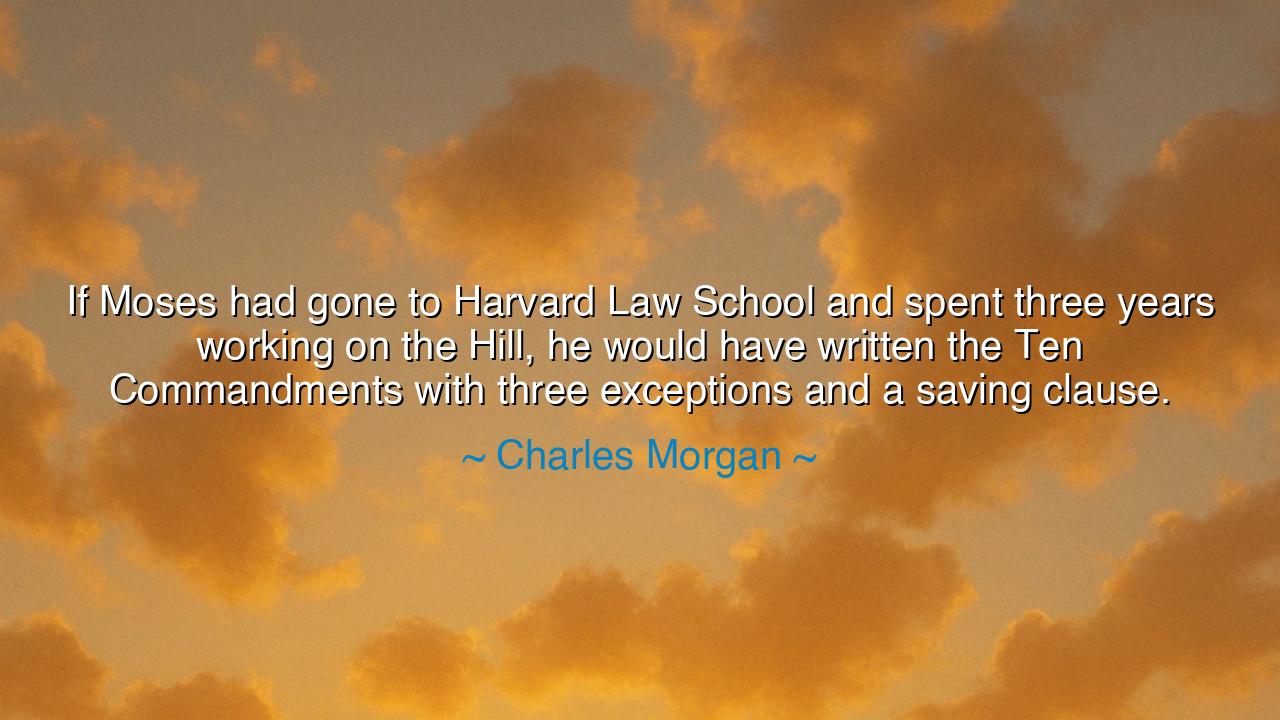
If Moses had gone to Harvard Law School and spent three years
If Moses had gone to Harvard Law School and spent three years working on the Hill, he would have written the Ten Commandments with three exceptions and a saving clause.






Hear the satirical wisdom of Charles Morgan, who declared with biting humor: “If Moses had gone to Harvard Law School and spent three years working on the Hill, he would have written the Ten Commandments with three exceptions and a saving clause.” This saying pierces like a blade through the heart of modern law and politics, exposing their endless complexity. Where once the divine lawgiver came down from Sinai with simple, eternal decrees—clear enough for shepherds and kings alike—Morgan suggests that the modern mind, entangled in legislation and politics, would bury such clarity beneath layers of exceptions, conditions, and loopholes.
The meaning is twofold. First, it is a critique of the legal world, where statutes often grow so long and twisted that even wise men cannot decipher them without years of study. What should be simple—“Thou shalt not steal”—would, in the hands of lawmakers, become a labyrinth: “Thou shalt not steal, except in cases of taxation, eminent domain, or classified exemptions, provided that such taking is deemed necessary by duly authorized officials.” Second, it is a lamp held up to politics, which too often seeks compromise not for justice, but for expedience, creating laws that are neither clear nor just, but muddied with saving clauses designed to shield power from accountability.
Consider the contrast between the Code of Hammurabi and the swollen volumes of modern statutes. Hammurabi’s code was carved upon stone, meant for all to see, its laws clear and unbending. In contrast, modern legal codes often stretch to thousands of pages, filled with footnotes, exceptions, and technicalities known only to lawyers. The ancients sought clarity; the moderns, through over-craft, often sow confusion. This is the irony that Morgan’s wit illuminates: the greater our learning, the less clear our speech; the higher our institutions, the more entangled our justice.
History gives us many examples. Recall the fate of the United States tax code, originally intended to be a straightforward means of funding government. Over decades, it grew into a monstrous tome of tens of thousands of pages, riddled with exceptions, deductions, and clauses serving special interests. What began as a simple principle—contribution for the common good—was transformed into a puzzle few could understand without costly guidance. So too, Morgan warns, might even the Ten Commandments themselves have been drowned in human complexity if left to politicians and lawyers.
Yet his words are not merely ridicule, but a call to remembrance. They remind us of the power of simplicity, the strength of clarity. When laws are written plainly, they are understood and lived by all. When justice is direct, it carries authority not from coercion, but from recognition in the heart. The Ten Commandments endure not because they are endlessly nuanced, but because they speak with crystalline certainty to the conscience of mankind.
The lesson, then, is this: resist the temptation to cloak truth in endless clauses. Whether in law, in speech, or in life, strive for simplicity. Say what you mean with courage, and mean what you say with integrity. Do not hide behind exceptions when clarity is demanded, nor weave saving clauses when justice must be firm. For what is muddled in language will be muddled in action, and a society that cannot speak plainly cannot act justly.
Practical action follows: as a citizen, demand laws that are understandable, not written in riddles. As a leader, craft rules and decisions that ordinary people can follow without fear or confusion. And in your own dealings, live as Moses did—not hedging every word, but declaring what is right and binding. For clarity is the ally of justice, and simplicity is the armor of truth.
So let Charles Morgan’s words be remembered not only as satire, but as wisdom. Justice does not require endless clauses; it requires honesty. Let your laws, your promises, and your conduct be like stone tablets—firm, clear, and enduring. In this way, you will walk in the ancient strength of those who spoke truth without compromise, and your life will stand as a law more powerful than all the loopholes of men.






AAdministratorAdministrator
Welcome, honored guests. Please leave a comment, we will respond soon